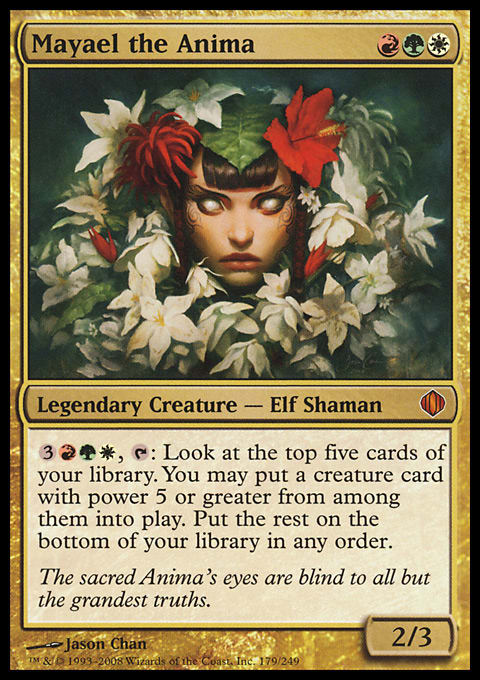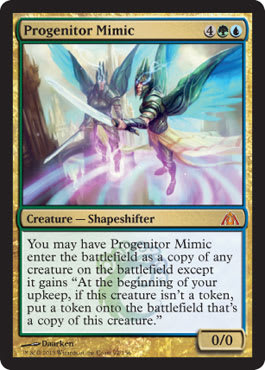Hello, reader. If you're here because you heard someone refer to a "75%" deck and you came searching for what that might mean, this article is an excellent recap of the guidelines we use to build a 75% deck. The article you're reading now is the first in a years-long series and I would not recommend reading just this one article. Thanks for reading and if you have any specific questions, contact me on twitter @jasonealt.
If you'd told me a year ago I'd be writing about Commander, I probably would have laughed. It's not derision for the format or anything; I'd probably have had the same reaction if I were told that I'd be writing about Legacy or Limited—playing at all, really. Yet, here we are. I'm writing about Commander.
It shouldn't be too difficult to come up with a long list of different reasons someone might decide to play Commander. Some people like being able to play the big, Timmy cards, some people like making decks full of Japanese foil cards and keeping the deck together forever in a format where metagame shifts don't really happen because there is no metagame. Some people find it accessible and think it's the best way to play multiplayer. I find Commander players to be the perfect people to trade with and to buy from and sell to because the list of cards they are looking for is much larger than the list of cards Standard players want, and the cards they undervalue and overvalue are the exact opposites of the cards Spikey players value.
Recently, Gathering Magic Content Manager Adam Styborski was our guest on Brainstorm Brewery. We got into a conversation after the podcast recording session officially ended that we really liked, so we decided to release that conversation as a supplemental recording. It's only about twelve minutes, but it's worth a listen because I mention my approach to Commander.
When Corbin mentioned that his most recent creation was a Sharuum the Hegemon deck, I said, “Sharuum is so hard not to be the best deck or the worst deck. Building a mediocre, I-don't-win-every-game Sharuum deck is hard.”
“Adam,” I asked, “do you agree that you don't want to win every game of Commander?”
How good is too good?
Adam seemed to be with me. “The thing about Commander is that I want the experience to be a good one. If a bunch of insane things happened and I tried to do my thing . . . I'm way happier with that experience, even losing.” And don't we all agree with that? There are myriad formats people can play if they want to be Spikes, and there are even outlets for competitive Commander decks, although those are best played against other players who also built spikey decks and who are using French or “Duel Commander” rules. At around the eight-and-a-half-minute mark in the recording, I talk about how I try to build my decks and call them “75% decks,” meaning they are 75% of the way to an optimal build and just good enough to beat a deck built to be 100% optimal if I play tight and get lucky. That way, it is a challenge for me and allows me to benefit from the 100% decks facing opposition from some of the other players at the table. These 75% decks are also not going to turn four an entire table of casual players who just want to jam a bunch of Umbras on an Uril or make a hundred Sand Warrior tokens with Hazezon Tamar. I'm not out to ruin anyone else’s night by killing him or her quickly or ruin my own night because I played Evasive Maneuvers right out of the box and have no game against even the most casual of builds.
So how do you know if your deck is too good? Part of answering that question is gauging how your group responds. You start each game of Commander by setting your commander aside, face up. Does your playgroup say “Oh, okay, Jason's playing Mayael,” or do people say, “Oh, super. Jason's playing Maelstrom Wanderer again.”? If you get the sense that one of your decks is unfair, wins the same way every time, wins too quickly, or causes people in your group to begin main decking cards to address cards or strategies from your deck specifically, it may be time to sit down and have a look at the deck as a whole.
In a good night of Commander for my playgroup, I will win 1 ÷ X games, where X is the number of players at the table. It isn't about letting anyone else win, it's not about fetching mana dorks with your Tooth and Nail because finding Deadeye Navigator and Molten Primordial is going to make everyone upset, and it's not about being patronizing to your group. Winning that proportion of the games will avoid painting a target on your back or making anyone resent your involvement. You want to make decks that let you “do a thing” that will be fun to do and that don't prevent others from “doing their thing” on principle, but that may provide ways for you to actively stop opponents if they are getting out of hand.
What Does a 75% Deck Look Like?
It's helpful to illustrate what kind of power level I shoot for by posting one of the decks I use often with my playgroup, that I can use to win 1 ÷ X games, and about which no one has complained.
"Riku of Two Reflections"
- Commander (0)
- Lands (38)
- 1 Alchemist's Refuge
- 1 Command Tower
- 1 Copperline Gorge
- 1 Temple of the False God
- 1 Thespian's Stage
- 1 Vivid Grove
- 1 Vivid Crag
- 1 Vivid Creek
- 1 Temple of Abandon
- 1 Temple of Mystery
- 1 Rootbound Crag
- 1 Hinterland harbor
- 1 Sulfur Falls
- 1 Izzet Boilerworks
- 1 Simic Growth Chamber
- 1 Gruul Turf
- 1 Breeding Pool
- 1 Steam Vents
- 1 Stomping Ground
- 8 Island
- 6 Forest
- 5 Mountain
- Rocks and Other Brown Stuff (16)
- 1 Sol Ring
- 1 Izzet Signet
- 1 Gruul Signet
- 1 Simic Signet
- 1 Fellwar Stone
- 1 Strionic Resonator
- 1 Illusionist's Bracers
- 1 Darksteel Ingot
- 1 Chromatic Lantern
- 1 Crystal Shard
- 1 Basalt Monolith
- 1 Trading Post
- 1 Thran Dynamo
- 1 Solemn Simulacrum
- 1 Gilded Lotus
- 1 Staff of Nin
- Dudes (27)
- 1 Coiling Oracle
- 1 Echo Mage
- 1 Wood Elves
- 1 Vithian Renegades
- 1 Borderland Ranger
- 1 Viridian Shaman
- 1 Eternal Witness
- 1 Somberwald Sage
- 1 Clone
- 1 Bloodbraid Elf
- 1 Fathom Mage
- 1 Oracle of Mul Daya
- 1 Archaeomancer
- 1 Mindclaw Shaman
- 1 Hypersonic Dragon
- 1 Prophet of Kruphix
- 1 Izzet Chronarch
- 1 Progenitor Mimic
- 1 Brutalizer Exarch
- 1 RubbleHulk
- 1 Hellkite Tyrant
- 1 Gruul Ragebeast
- 1 Deadeye Navigator
- 1 Prime Speaker Zegana
- 1 Molten Primordial
- 1 Diluvian Primordial
- 1 Terastodon
- Spells (18)
- 1 Artifact Mutation
- 1 Explore
- 1 Rampant Growth
- 1 Farseek
- 1 Treasure Hunt
- 1 Hinder
- 1 Spell Crumple
- 1 Rhystic Study
- 1 Far Wanderings
- 1 Beast Within
- 1 Harmonize
- 1 Parallel Lives
- 1 Control Magic
- 1 Rite of Replication
- 1 Bribery
- 1 Desertion
- 1 Tooth and Nail
- 1 Time Stretch
Now, a 100% Riku deck would look a lot different. You will notice a few things by looking at this list.
First of all, it has quite a bit of artifact removal and some countermagic. This is more to prevent the best player at the table from pulling too far ahead than it is to ensure my own victory, but these can easily double as ways to make sure you win. Spells like Spell Crumple and Hinder can be very potent against powerful commanders, but you are able to choose the power level of spell you counter, making them surprisingly scalable and key components in a 75% deck.
Second, you will notice there aren't a ton of ways to take extra turns. This is by design. If I grow bored and want the game to end, I can double a Time Stretch with Riku, and if any of those extra turns yield an Archaeomancer, Eternal Witness, or Izzet Chronarch, that is usually game. However, I do this to end games, I don't make everyone watch me take extra turns in the middle of a game with cards like Time Warp if all I am doing is mana ramping and improving my board slightly. Furthermore, this helps me keep the cost of the deck low. A 100% Commander deck doesn't mind shelling out $50 for a Temporal Manipulation, but a 75% deck doesn't feel the need to run that many copies of cards to take extra turns—you either find a way to win earlier or you wrap things up if everyone is durdling and the game runs long enough for you to take four turns with Time Stretch.
Last of all is a concept I want to go into in a bit more in depth. I mentioned the concept of scalability with respect to my counterspells, and I think this deck illustrates scalability with respect to my spells and creatures very well. I find the easiest way to make sure your deck is a true 75% Commander deck is to make the deck play differently against different power levels in your opponents' decks. If I have never played against an opponent before and all I have are my 100% smash-everyone-at-the-table deck and my 50% take-it-easy-on-new-people deck, which do I bust out, and how do I do so without disrespecting my opponent? I find that if a lot of my powerful spells are entirely dependent on what is in his or her deck, you can bring the same deck to two different matches and have two entirely different outcomes.
If you cast a Bribery on an opponent and the best card in his or her deck is a Furyborn Hellkite, you should be able to dispatch that player—or at least make it a good game with said Furyborn Hellkite. Similarly, if the player’s deck is quite good, grabbing his or her It That Betrays to try to beat him or her with it is going to give an less powerful deck like yours a fighting chance. Not only that, but a card like Bribery can give you a lot of information about the power level of his or her deck, and you can plan your plays accordingly. My deck is loaded with such scalable spells—Progenitor Mimic, Rite of Replication, Bribery, Desertion, Control Magic; even Hellkite Tyrant is a scalable card, grabbing a Sisay's Ring if the player has a Sisay's Ring and grabbing a Mind's Eye if the player has a Mind's Eye. It's not much of a win condition, but it can help you bring the power level of your deck in line with the opponent’s by sheer virtue of using his or her own cards in place of your own cards, which may be too powerful or not powerful enough. Against better decks, Tyrant can help you catch up, and against less powerful decks, I find he is an almost nuclear weapon-like deterrent that can help you make sure that, if anyone pulls too far ahead, you can try to bring that player in line and potentially keep him or her from attacking you for fear of retribution.
Finally, Clone effects like Progenitor Mimic and Rite of Replication can be very potent even if your opponent is playing subpar creatures because of the extent to which multiple copies can get out of hand quickly. These are reliable ways to make sure you can win any game because even the opponent’s Bellowing Tanglewurm is going to be pretty formidable if you suddenly have five copies of it. If your opponent is playing very good creatures, a Progenitor Mimic can give you more very good creatures and give the opponent something to deal with that is as dangerous and potent as the rest of his or her deck—just as if you had packed your deck with creatures that powerful. Besides, why would someone like me keep a $50 Kozilek, Butcher of Truth tied up in a deck when I can borrow one for the cost of a $0.50 Clone? Similarly, that Clone isn't going to play like a Kozilek against someone who is trying to attack you with Divinity of Pride. If you are feeling saucy, copying the Clone with Riku and copying the token with Parallel Lives is a possibility, but you don't have to make plays that powerful unless you feel you need to.
I hope this has illustrated the concept of a 75% deck a little bit better. Had you noticed you tend to build decks like this for certain playgroups but didn't know this concept had a name? Do you think my deck could use tuning (no Commander deck is ever finished, is it?) because it's too strong or too weak? Leave it in the comments section. Thanks for reading, and I hope to be back soon to talk about more decks and more philosophy.



























